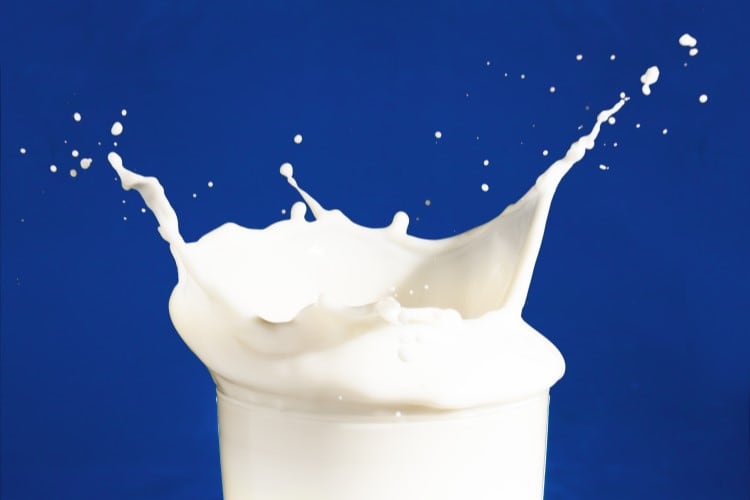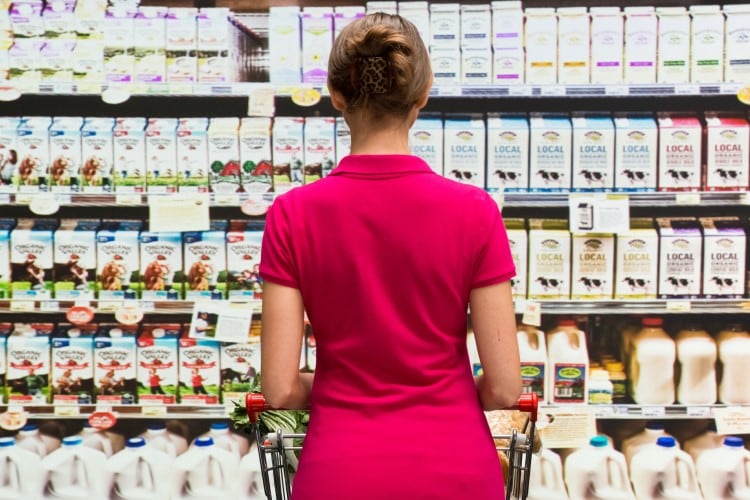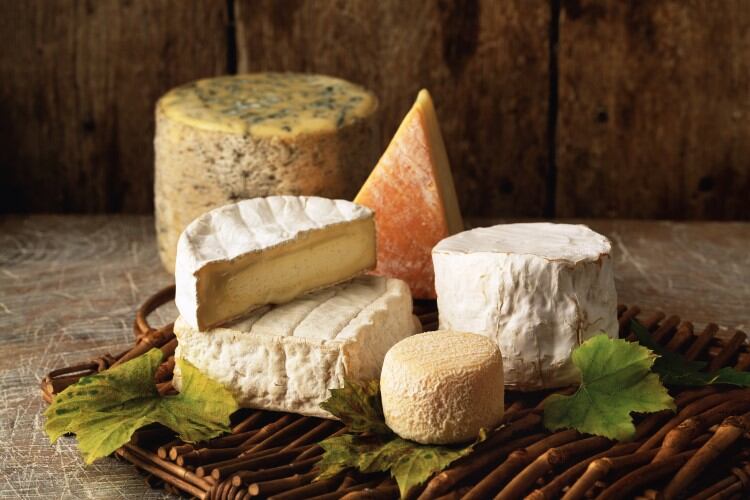The biotech start-up, which leverages artificial intelligence (AI) and data science to concoct the most suitable plant mix that could mimic the functionality of traditional dairy ingredients, has made its first discovery – Caseed, an alternative to animal-derived casein.
The company claims the ingredient – which is said to boast ‘nearly indistinguishable’ functional and taste properties to the dairy-based protein - could open the floodgates to superior cheese alternatives.
A lot depends on this development. The Bel Group, which inked a strategic partnership with Climax Foods earlier this year, is looking to leverage the start-up’s cow-free casein to make cheese analogs which promise to be superior to existing plant-based alternatives in terms of nutrition, functionality and flavor. Casein has been described as the 'holy grail' of cheesemaking since the protein is responsible for texture, stability and stretchability.
Carolin Sorlin, chief venture officer at Bel Group, told this publication in April 2023: “In 18 months, we should be able to put on the market plant-based cheeses that look and taste like dairy cheese and have a high level of nutrition…We want to have enough protein in our plant-based cheeses…it’s hard to achieve a good level of protein because when you include high-protein ingredients such as pea or soy, you have a strong aftertaste. For calcium, it’s a similar situation.” Taking advantage of Climax Foods’ discoveries, Bel Group is set to re-formulate its core brands first – including Mini BabyBel, The Laughing Cow, Boursin, and Kiri - before creating ‘from scratch’ new cheeses with the start-up. Products are expected to launch in the US and Europe in Q4 2024.
From the company’s ‘Deep Plant Intelligence Platform’ to their proprietary machine-learning process, what lies behind the tech speak? We reached out to Climax Foods to find out more about all this – and how its process compares to other means of deriving dairy-identical, animal-free proteins, such as precision fermentation.
‘The most scalable and cost-effective solution’
“Climax Foods is not using ‘precision fermentation’ but ‘precision formulation’, a proprietary, AI-driven process that places existing plant proteins into precise formulations calculated by Climax's unique algorithm that unlock latent capacity to stretch and melt like dairy casein,” said a company representative. “This does not require genetic engineering, novel fermentation solutions, or large capital expenditures to create a casein replacement that mimics the taste, texture, and performance of cow's casein. It's indistinguishable, without containing the allergens that exist in other casein replacements.”
In simpler terms, the firm uses a ‘gentle process’ to isolate the protein and a ‘careful and precise’ formulation to unlock stretch and melt. Through several formulation and optimization cycles – facilitated through data and modeling – the company is then able to sift through a large amount of combinations at a pace that outstrips traditional approaches.
“Climax Foods' success at creating identical replacements to cheeses using plants comes from their in-depth understanding of the biodiversity of the plant kingdom - what they call Deep Plant Intelligence platform,” a company representative said. “They can isolate the base ingredient, which becomes their casein replacement, from not one but a large variety of different seeds and legumes, such as pumpkin seeds, and then they enable the casein-like functionality through their proprietary, AI-backed process. They are still working to identify which exact blend of seed or legume they wish to use for the most scalable and cost-effective solution.”
Cost is of paramount importance in a market where animal-free ingredients often come at premium due to the complex R&D involved in their formulations. Climax Foods’ representative told us the company’s ingredient could be made “at a competitive cost to that with dairy when produced with economies of scale.” “The costs of precision fermentation-made products are much higher,” they added.
When cheese experts meet data scientists
Broadly speaking, Climax Foods’ machine-learning efforts fall into two categories: exploration and exploitation of data, we were told.
During the exploration phase, the company invite cheese makers to evaluate various possible plant combinations suitable for a particular development purpose. This collaboration results in even more potential combinations – an amount so large that AI needed to be involved to process the data.
“There is an unfathomably large number of potential combinations of plant-based ingredients that a manufacturer can choose from,” the Climax Foods rep explained. “Add cheesemaking choices into this space, and the number of combinations quickly outstrips any possibility of systematically testing these choices.”
Explaining how the company went about building the foundation of its machine-learning process, the spokesperson said: “Climax Foods started with smart and talented cheesemakers and mapped the choices they made by capturing as much information as possible about their formulation and processes; then they measured their cheeses as thoroughly as possible. This provided the foundational model to build from, and once this was in place, every cheese became an additional data point to refine their model.
“Additionally, they are working to deeply understand as many ingredients as possible before they are used in a formula. Pairing this work with publicly available data about plant ingredients allows them to make predictions about the functional behavior of untested ingredients.”
When a suitable match is discovered, the exploitation phase begins. “In the case of Caseed, the team found something that was promising, and then applied their algorithms to survey as many potential conditions as possible. They learned what worked and what didn’t, which has given them dairy-like melt and stretch from a plant that is currently grown on hundreds of thousands of acres annually.”
‘Cheese needs protein to be cheese’
So, how does a cheese alternative made with Caseed fare against conventional dairy cheese? Climax Foods says foods critics and CPG representatives they have worked with have claimed that the company’s plant-based alternatives were ‘nearly indistinguishable’ from dairy in taste, texture or performance despite being made from legumes and seeds. The company said it’s building so-called sensory program, bringing statistical significance to reflect the parity achieved in sensory experience with that of conventional dairy cheeses.
Asked how the company gets the taste right – specifically, if the firm relies on additives to achieve a dairy-like flavor – the spokesperson told us it’s all in its plant-based protein. “Like traditional cheese makers, [they do it] through the aging process, where the cultures do their magic and create rinds, veins, and aromas. Climax’s cheeses are made only from plants -seeds and legumes - and cheesemaking cultures.
“Our current formulations using Caseed do not rely on additives to achieve their convincing tastes and textures. Since Caseed is a protein, it dominates the mouthfeel of plant-based cheeses just like dairy casein does. They are delicious because they are starting from first principles. Cheese needs protein to be cheese.”
The company claimed that its formulations boast ‘much higher’ protein content than commercially-available alternatives that leverage starches and fats, and can ‘match dairy cheese’s protein content’ while containing less saturated fat, too.
The protein is also winning on the sustainability front: “With current rough calculations, Climax Foods estimates that their protein would enable cheeses to use 90% less water and land than equivalent dairy cheeses,” the spokesperson told us. “Furthermore, approximately 90% less CO2 equivalents would be emitted compared to conventional dairy.”
The path to commercialization
The plant source at the heart of Caseed cannot be revealed, but the company told us that the ingredient is already grown and manufactured at a commercial scale; it is widely consumed, non-allergenic and non-GMO, so a regulatory path towards the commercialization of products made with it is expected to be simpler compared to what precision-fermentation dairy alternatives are required to go through.
For the time being, Caseed will be leveraged by the Bel Group, which also holds a stake in the start-up, with the Climax spokesperson stating that whether the data-science specialist would decide to commercialize the ingredient and make it available to other manufacturers would ‘be determined as the supply chain is further built out and in line with capacity to deliver on its own products as well as those of other companies’.
Asked if the plant-based category would ever achieve price parity with traditional dairy, the company said that in some categories, this could be ‘achievable’. “At the end of the day it all comes down to being smarter about inputs to the supply chain process, simplifying production and executing with increasing efficiencies to achieve the scale and reach of existing dairy in a sustainable way that will unlock Climax’s full potential and that of the plant-based category,” the company spokesperson concluded.
The race for superior dairy-identical plant proteins hots up
According to Euromonitor data quoted by the Good Food Institute (GFI) Europe and the latter’s Plant-Based: State of the Industry report, global retail sales of plant-based meat, seafood, milk, yogurt and cheese reached $28bn while remaining a tiny fraction of the multi-trillion-dollar market for conventional animal products.
Nevertheless, GFI notes that consumer interest in plant proteins is rising globally, something that hasn’t escaped the attention of dairy giants. In US retail, Chobani’s non-dairy range has yielded the third highest plant-based milk dollar sales, while Danone’s Silk and So Delicious are also in the top 10 for 2022.
In Europe, sales of plant-based dairy alternatives saw a double-digit growth between 2020 and 2022, according to another GFI report. The cheese category recorded the most rapid growth of 56%, followed by spreads (40%), milks (19%) and ice cream (14%). Speaking to DairyReporter in May 2023, Rabobank dairy analyst for Europe Richard Scheper said ‘alt dairy is here, it’s established, and it’s not going away’ but warned that the category may grow at a slower pace, e.g. mid-range single digits. He added that taste and price parity ‘might be the most important factors for plant-based products’, suggesting that improved formulations could propel the category’s growth as consumers continue to seek better-tasting dairy alternatives.
Competition to create the next-best dairy-identical yet cow-free protein alternative is hotting up – at the time of writing, Dutch plant-based ingredient manufacturer Fooditive has just announced that it is seeking partners to create a product that contains its precision fermentation-derived casein in order to obtain approval as a Novel Food in the EU.
But regulatory approvals remain a significant hurdle for precision fermentation dairy companies in Europe, while in the US, such products represent a small niche within the animal-free dairy segment. This has led companies such as Better Dairy, Perfect Day, Formo and ImaginDairy, to form industry associations - the Precision Fermentation Alliance in the US, tasked with raising awareness about the technology, and Food Fermentation Europe, which is pursuing ‘an expeditious development and rollout of innovative fermentation technology and products’ on the continent.
Standing Ovation, which also develops casein through precision fermentation, recently joined the two trade bodies. Sébastien Louvion, director of regulatory affairs at the Paris, France-based start-up, commented: “We are at the beginning of a new and exciting era. Technologies for new, more planet-friendly protein resources are emerging. Next step is to make them known to consumers, and for most of these new alternative proteins, to bring them to market.”




